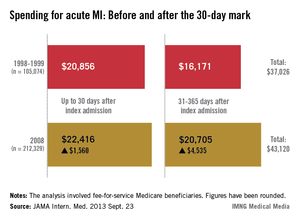Spending on acute myocardial infarction rose by 16% per patient from 1998 to 2008, with most of that increase coming on days 31-365 after the event, according to an analysis of Medicare beneficiaries in JAMA Internal Medicine.
Total spending went from $37,026 per patient in 1998-1999 to $43,120 in 2008, an increase of $6,094 (16%). Almost 75% ($4,535) of that increase occurred 31-365 days after the index MI, with just a quarter ($1,560) coming in the first 30 days, reported Donald S. Likosky, Ph.D., of the University of Michigan, Ann Arbor, and his associates.
"Although the first 30 days after admission are the focus of many bundled payment initiatives, care after the initial admission is still very much ‘fee for service,’ with greater intensity of care per patient rewarded with increased Medicare reimbursements," the investigators wrote, suggesting that a system "akin to accountable care organizations" may be needed beyond the 30-day mark (JAMA Intern. Med. 2013 Sept. 23 [doi:10.1001/jamainternmed.2013.10789]).
The cross-sectional analysis of fee-for-service Medicare beneficiaries included 105,074 acute MI patients for 1998-1999 and 212,329 patients for 2008. The study was funded in part by a grant from the National Institute on Aging.


